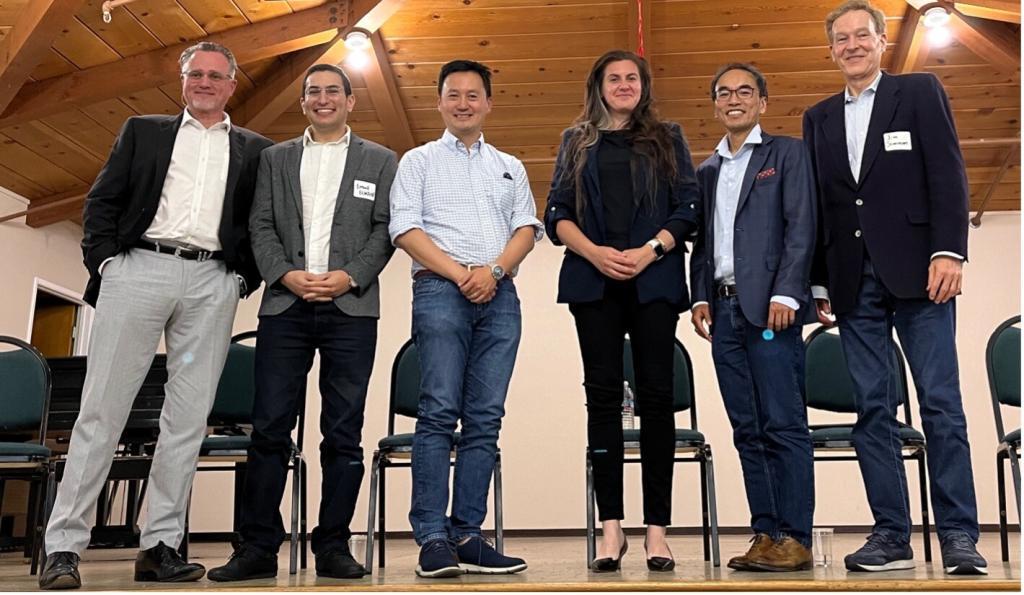
I had the honor and privilege to organize and moderate a panel on “Business & Society in the Age of Generative AI, Large Language Models and ChatGPT” for the Harvard Business School Association of Northern California HBSANC.
Our panelists were Olaf Groth – renowned author and founder of think tank Cambrian Group, Zornitsa “Zori” Kozareva – co-founder CTO of enterprise AI startup SliceX AI and former professor of NLP at the University of Southern California, Emad Elwany – co-founder CTO of legal AI startup Lexion and David Wang – Chief Innovation Officer of tech law firm Wilson Sonsini. I’m the founder of Oakseed Ventures.
Where are Generative AI, Large Language Models and ChatGPT headed?
Olaf kicked off the exciting panel by sharing insights from his upcoming book “The Great Mobilization: Strategies and Designs for a Smarter World.” The Cognitive Economy is one of the “Five C” tectonic forces shaping the global economy. As many as 300 million jobs will be impacted by AI, and it will be difficult to retrain such a large number of people.
Emad shared his vision for Lexion, to provide legal professionals with the tools to be more effective. As one of the first to incorporate Large Language Models (LLMs), Emad observed that “hallucination” is a real problem. In fact, as the models become bigger, the “explainable” problem becomes worse, and fixing the hallucination problem is like “whack a mole” – patch a problem and another shows up.
David shared his perspective on the technology and what it will mean for the legal profession. Referring to the book “Thinking, Fast and Slow” by psychologist Daniel Kahneman, David likened AI to “system 1” instinctive thinking. Human instincts can be unexplainable, biased, and wrong, and so can AI. David doesn’t think AI will replace lawyers but change the legal profession in unexpected ways. For example, he’s observed contracts become longer, as both sides of the negotiating table use generative AI; this is a continuation of a trend that really began with word processing. He also believes that there will be simply more lawsuits or litigations until the courts become the bottleneck, as the legal profession becomes more efficient.
Challenges with AI
Zori shared her perspective that a major problem exists in AI today that corporates are not ready to share their data with AI companies. Also, AI companies like OpenAI can kill the businesses of companies that offer services on top of their AI platform overnight. Zori sees a faster adoption of AI and LLMs in the consumer segment. In enterprise applications, marketing and consumer experience currently lead the way while segments like medical are slower.
On whether AI will surpass human intelligence and where the world is headed with AI, the panel had a lively debate. Zori noted that LLMs still fumble with basic math and Emad noted that AI is still good at doing specialized tasks, and does not have the general intelligence that humans have. Olaf quickly pointed out that humans often make the mistake of using ourselves as the model for intelligence, whereas other organisms are better than humans in other forms of intelligence. We cannot judge AI by comparing it to a human. Historically, capital markets have not been able to capture the value and reward companies for upgrading human capital, as compared to capital investments. Hence, Olaf believes that companies will be forced to use more and more AI in the companies.
What should CEOs do in Age of AI?
On the question of what CEOs should do in the age of AI, both Olaf and Emad opined it is important to not just work on AI for AI’s sake, but to figure out how companies can differentiate and solve real problems with AI. Olaf points to AI Readiness Self-Assessment Tool to help companies evaluate their Company AI Readiness Index (CAIR) and identify and prioritize areas for action and recognize potential harmful missteps.
The audience joined in a lively discussion with the panelists. On the question of what generative AI is best used for, Emad shared that generative AI has lots of applications across the creation of texts to images but there are many better, less computationally demanding AI techniques for language understanding and classification. For instance, generative AI would not be good at helping a doctor with diagnosis, but a good application would be helping doctors improve the tone of what they write to their patients.
On the question of whether companies can trust AI companies with their data, Emad pointed out that it will boil down to legal contracts and trust. Today companies already place their data in public clouds operated by Microsoft and others. Olaf opined that humans create by getting inspiration or combining the creation of others, and society will have to come to terms eventually that AI will do the same.
Thank Olaf, Emad, David, and Zori for taking valuable time off to participate in the panel and share their insights on where business and society are headed in the age of generative AI, Large Language Models, and ChatGPT.